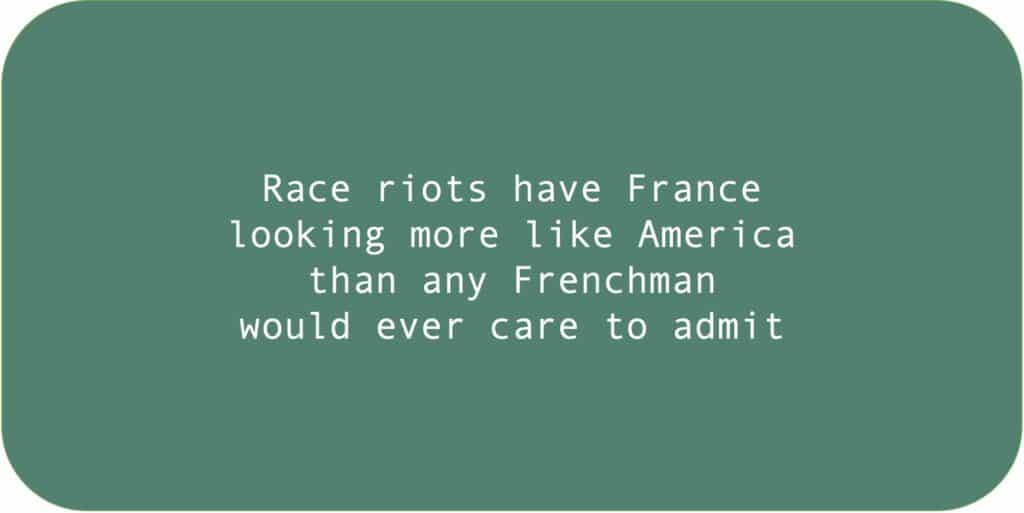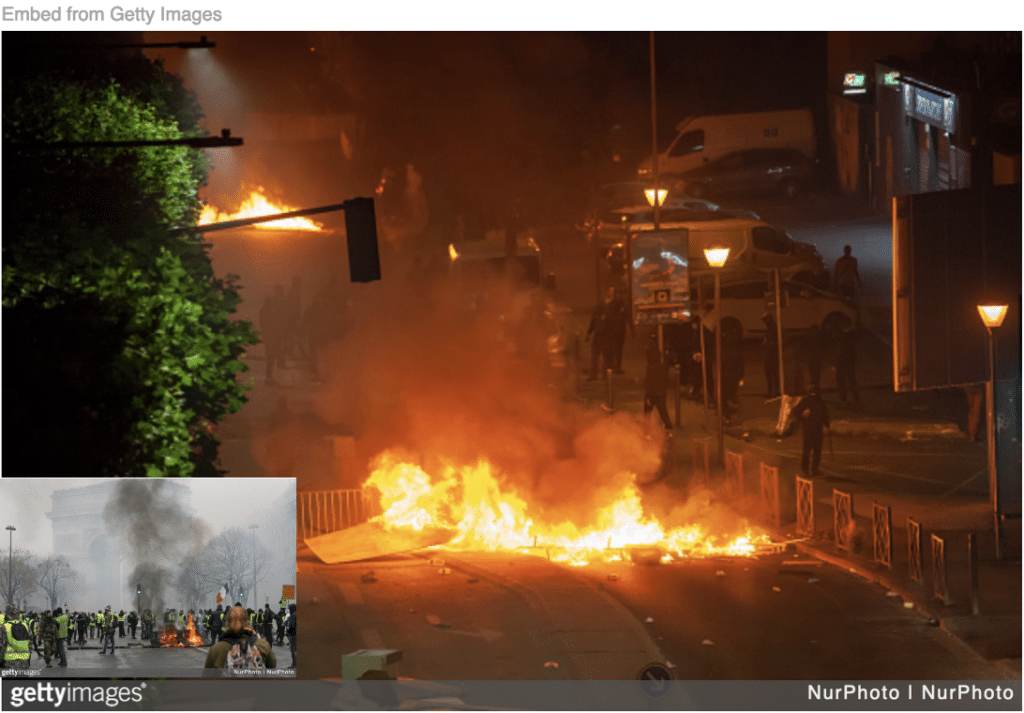
Last night, for the fifth night, riots spread across France like wildfire. News reports and reels speak volumes. Besides, it might suffice to say they erupted after Tuesday’s George Floyd-like killing of 17-year-old Nahel Merzouk. Because systemic racism, economic inequality, and brutal policing are the root causes of these riots, too.
Those root causes have turned France into a tinderbox. So any racial spark could result in young people rampaging — torching cars, vandalizing buildings, looting businesses, and clashing with police.
That’s why the prevailing fear is that riots will continue erupting with destructive frequency. Yet, each time riots erupt, French politicians act “shocked, shocked.”
Racism, inequality, policing, and migration are igniting riots
French politicians pretend that only wayward youth incite and participate in these riots. Yet the equally destructive Yellow Vest riots of 2018 and 2019 belie their pretense.
In fact, those riots featured middle-aged, middle-class, and poor French citizens. And they were protesting taxes, income, and other socio-economic policies that continually favor the elite at their expense.

But the phenomenon of mass migration will make these riots even more commonplace. That will be the case if French administrations refuse to deal with the racism and inequality inherent in policing migrants, rather than implementing policies to assimilate them. Indeed, that’s why similar riots have erupted even in Sweden and Italy.
The failure to assimilate
Arguably, these riots represent French colonialism coming home to roost. After all, Nahel embodied the enduring frustrations of alienated young immigrants from places like Algeria, Niger, and Mali. Those frustrations are rooted in systemic low education and high unemployment, leading to police harassment and brutality. That’s the vicious cycle they’re in.
But their frustrations are no different from those of Black Americans who feel alienated for the same reasons. There’s no denying that racism has precluded many minority men from assimilating economically, socially, and politically in America. Similarly, racism has prevented many minority men from assimilating in France.
Indeed, this similarity moved me nearly 20 years ago to publish a blog post titled “World Beware: French Riots Affect Us All,” on November 8, 2005.
Even back then, disillusioned and disaffected young immigrants were spreading riots across France like wildfire. That alone indicts the failure of France to assimilate them. And that’s because, like American politicians, French politicians would rather devise methods to combat these riots than implement policies to address their root causes. I cannot overstate this point.
Black in America vs. Black in France
The French looked on at race riots in America during the 1960s with self-righteous outrage. And the riots following the police beating of Rodney King and the killing of George Floyd reinforced their outrage.
The French decried the mockery those violent racial protests made of America’s famous declaration that “all men are created equal.” That’s because the French presumed they were treating Blacks in France with “liberty, equality, and fraternity.”
But even their notorious imperial gall cannot make the French oblivious to how violent racial protests in France are mirroring those in America. Such violent racial protests are becoming as commonplace in France as they are in America. And there’s no material difference between them.
Indeed, with all due respect to George Floyd, the BLM protests were more about the systemic racism, economic inequality, and brutal policing that affect all Blacks in America. Likewise, with all due respect to Nahel Merzouk, the riots raging across France today are more about the same affecting all immigrants in France.
Incidentally, the most perverse feature of riots in America is the way rioters often vent frustrations with White police by vandalizing and pillaging their own Black neighborhoods. French rioters are even manifesting this social pathology. But I suppose if you’re already feeling alienated and hopeless, destroying your neighborhood to reflect that alienation and hopelessness makes sense.
Though, a French immigrant highlighted an interesting difference. She famously bemoaned that:
If you are a first-generation born in America, you are an American. But even if you are a fifth-generation born in France, you are still an immigrant.
Alas, the prevailing similarities between race riots in America and France make clear that this is a distinction without a difference.